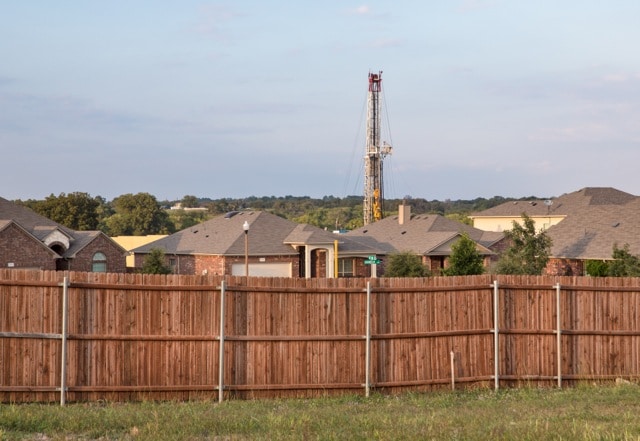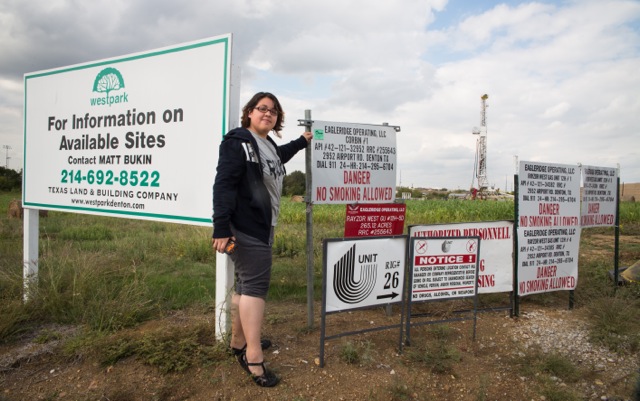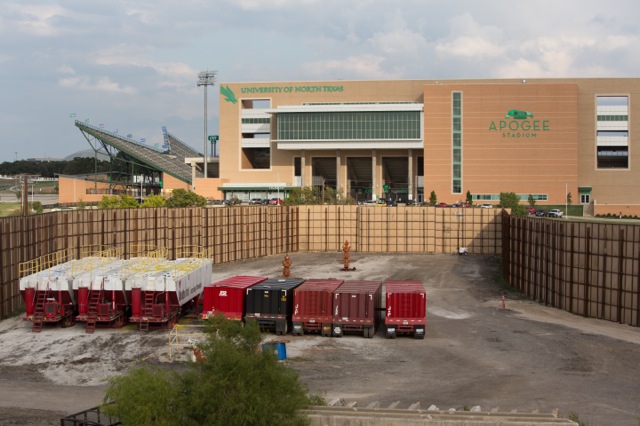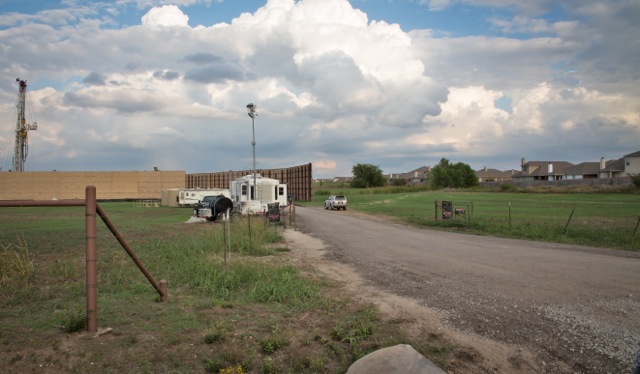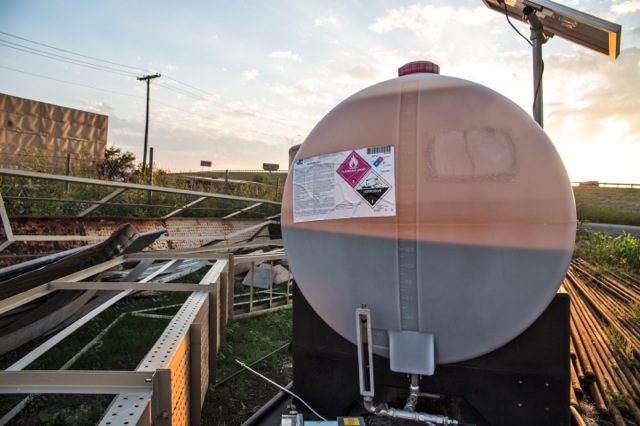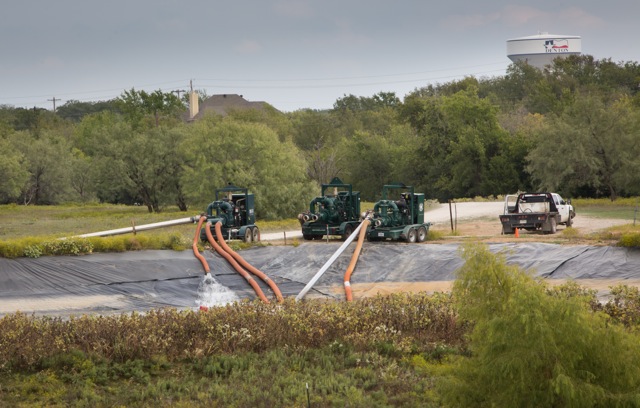In Denton, Texas, 40 miles northwest of Dallas, residents and students at the University of North Texas are getting a free course in what it’s like to live in the middle of a fracking field.
Although Denton officials created an ordinance mandating that fracking sites be at least 1,200 feet from homes, sites with gas wells already in place are exempt from the new rule. Some are less than 200 feet away from homes. Since Denton is full of existing drill pads, many find themselves living in the shadow of a fracking installation that exposes them to chemicals, noise and bright lights.
Rebekah Hinojosa, a student at the university, is no stranger to industrial pollution. She grew up in the Rio Grande Valley, near the U.S./ Mexican border, home to two Superfund sites.
Rebekah at an EagleRidge fracking site near the Denton Airport ©2013 Julie Dermansky
Still, Hinojosa had a rude awakening when she learned the university permitted fracking on campus.
“Now we have a frack site across the street from our dorms and the drill extends underneath half of the campus,” Hinojosa says. “Our campus looks pathetic with a fracking site situated 100 feet away from the university’s three wind turbines and platinum LEED certified football stadium, surrounded by signs saying, ‘We mean green!’ ”
It didn’t happen without pushback. Hinojosa and friends canvassed neighborhoods, held protests and attended city council meetings to push for stricter ordinances.
In February 2012, the Denton city council passed a temporary moratorium on fracking. It was a minor victory as industry used the “vested rights” loophole that allows them to work on sites with existing gas wells.
When the students and larger numbers of the public began attending city council meetings, industry started to bring in their own representatives. Hinojosa says, “Fake grassroots organizations would send vans full of people with prepared speeches that claimed fracking to be safe and clean. No matter how hard we worked on our speeches, our voices seemed mute compared to the fracking industry.”
EagleRidge well site across from the Apogee Stadium at University of North Texas ©2013 Julie Dermansky
“Incompatible with neighborhoods:” homeowners complain of toxic fumes
Many homeowners who purchased property in subdivisions near Bonnie Brae Street and Vintage Boulevard have had a rude awakening too. Drilling rigs were set up a few hundred feet from the developments. No one in the neighborhood retained their mineral rights. Homebuyers were not explicitly informed about the mineral rights or that not owning them could become an issue. Disclosure laws have not kept pace with the increasing threat industry poses to homeowners.
Subdivision off Vintage Blvd and Bonnie Brae Street in Denton,Texas ©2013 Julie Dermansky
When drilling began this fall, homeowners started complaining about toxic fumes, bright lights and noise. Council member Kevin Roden acknowledged on his blog that the situation for residents along Bonnie Brae was “awful.” He told the Denton Record Chronicle, “I don’t think I stand alone in recognizing that sort of activity is incompatible with neighborhoods.” Many worry their property values will nose dive and they won’t be able to sell now that fracking is in full swing.
University of North Texas Professor Adam Briggle said:
“Land developers can build to maximum capacity right up to gas wells without informing homebuyers about the industrial activities that will occur near them. Without stricter disclosure rules, they have nothing to lose from gas wells on their property. And thanks to vested rights, the gas well operators can continue to make money from their sites even after homes move in right next door.”
When residents complain, Briggle said city council takes the stance it is the public’s responsibility to do due diligence before buying a home. “Texas is conducting real world experiments in people’s backyards without their consent,” he said. “Though legally you can sell homes to people without their informed consent, it is not ethical.”
Insurance companies have taken notice of risks associated with fracking and don’t cover fracking-related risks to homeowners.
While fracking companies claim their practices are safe and the Texas Railroad Commission backs them up, Texans directly impacted by fracking, such as former mayor of Dish, Texas, Calvin Tillman, have taken it upon themselves to educate the public otherwise.
Tillman started a non-profit organization, ShaleTest Environmental Testing, which collects environmental data and provides testing services to low-income communities. His organization uses special equipment to expose fumes not visible to the naked eye, which escape from fracking sites.
Across the street from the university’s Apogee Athletic Stadium he videotaped escaping volatile organic compounds, which include the carcinogens benzene, xylene, methane and toluene, among others.
Watch EagleRidge fracking flowback at Apogee Stadium in Denton Texas, footage by ShaleTest.org:
EagleRidge Energy LLC, one of Denton’s largest frackers and operator of the pad site near Apogee Athletic Stadium, were cited for failing city inspections three times in 2012. They lost control of a well near Denton Enterprise Airport in April, causing traffic to be rerouted and fumes to spread over the city.
EagleRidge has little tolerance for public scrutiny. As Sharon Wilson wrote on her blog, Blue Daze, from a community meeting in Mansfield, Texas: “According to Mark Grawe, Chief Operating Officer at EagleRidge Energy (EagleRidge), Denton residents who object to his company’s reckless operations way too close to their homes, schools and parks are terrorists worthy of inclusion on the Department of Homeland Security’s watch list.”
Buddy Price, spokesman for the University of North Texas, would not give a yes or no answer when asked whether there is fracking on campus. However, Mark Grawe from EagleRidge confirmed to DeSmogBlog that fracking is going on under the school’s grounds. He added, “EagleRidge follows all the rules and conditions set by the City of Denton, the Environmental Protection Agency, the Texas Commission on Environmental Quality and the Railroad Commission.”
Chemicals across the street from the Apogee Stadium ©2013 Julie Dermansky
Tillman moved his family out of Dish after the area became contaminated by fracking. Now he is considering a run for Governor despite the industry’s efforts to demonize him. “People that call activists terrorists are enslaved to industry,” he said.
Meanwhile, Denton residents are taking part in an experiment they didn’t sign up for. Although some of them are still fighting to stall any further industrial development, the experiment is underway. The changes are straining the fabric of Denton’s society, pitting those concerned with health risks against others with stakes in industry. Meanwhile, the city is being turned into a gasland.
Fracking pond seen from I-35 in Denton, Texas ©2013 Julie Dermansky
Subscribe to our newsletter
Stay up to date with DeSmog news and alerts


